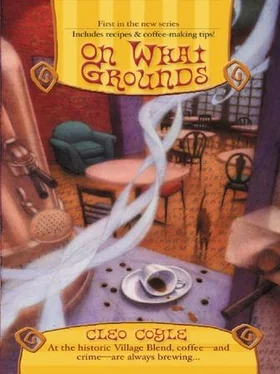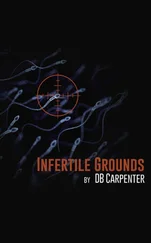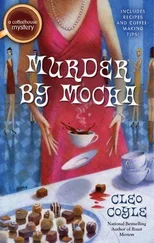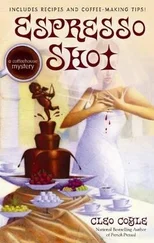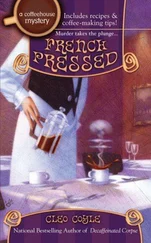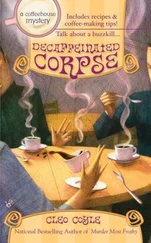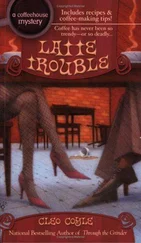“I am not a delivery person,” I said with just enough haughtiness to cow her attitude (a fraction anyway). “I’m the manager of the Village Blend, where Anabelle Hart works.”
Her eyes grew wide—as I had expected. Tucker assured me that gossip among show-people traveled “faster than Louisiana lightning.”
“What do you want?” asked the young woman, all curiosity now.
“I told you. I want to speak with the teacher of the ten A.M. Jazz Dance class. The one Anabelle attended daily.”
“You’ll find her in the large recital room. Third floor.”
“And her name is?”
“Cassandra Canelle.”
An array of leotards and leg warmers thundered down the squeaky wooden staircase as my black boots climbed up. Lord, I thought, these girls may have been light on their feet when it came to performing on stage but off they sounded like a herd of buffalo.
Giggles and chatter receded as I stepped onto the landing. The walls were stark white, as they had been downstairs. Framed black-and-white photographs of dancers leaping and posing hung in a level line. I followed that line to a single doorway. Strains of contemplative classical music grew louder as I moved closer, and I expected to find another class in progress.
To my surprise, I found a single dancer in motion.
She was graceful, lithe, and as elegant in appearance and bearing as Anabelle had been, though her skin was mocha rather than milk-pale, and her age was closer to forty than twenty. I didn’t know much about dance, but I knew enough to know her movements were not modern, hip-hop, or jazz. In her violet-blue leotard and skirt, she appeared to be performing the pirouettes of traditional ballet.
Hesitant to interrupt her, I simply watched. The composition accompanying her was tuneful, lucid, and emotional. The opening strings were sad and brooding, the dancer’s movements heavy and posed, then came a flurry of almost manic energy. Leaps and twirls matched the tempo with astonishing speed and grace. A bluebird on the wing. An orchid spinning madly.
She seemed so focused in the dance, I was utterly startled when, amid a final high leap, she looked straight at me and sharply called—“What do you need?”
From the doorway I held up the tray of cups. “I hoped we could sit down and talk about one your students—Anabelle Hart—”
The dancer stopped. Her body sagged. A weeping willow.
In the background, the music played on, reaching an emotional intensity that was almost unendurable.
“That’s Schubert, isn’t it?” I asked.
“What do you want ?” The accent had a slight Jamaican lilt.
“I want to know who from this studio might have been angry enough or jealous enough to push Anabelle down my service staircase.”
EIGHTEEN
CASSANDRA Canelle glared at me. Then, with light, even strides, she crossed the polished hardwood floor, placed hands on hips, and inches from my nose, said, “How dare you! What evidence do you have for such a charge? Who of my girls are you accusing?”
“No one. Yet,” I said. “I just know that Anabelle’s fall was not an accident, and I know dancing is a competitive arena. Do you care about Anabelle?”
“Of course I care about her. She is one of my star students! I am devastated she is lying in hospital. How dare you come here and—”
For the next five minutes, the dance teacher balled me out to the strains of Der Tod und das Mädchen (Schubert’s “Death and the Maiden”).
Boy, did I feel like a heel.
My blunt approach had yielded me useful information—with the young dancers. But it sure as heck was the wrong approach with their teacher.
“Please understand,” I said when she finally let me get a word in. “I also care about Anabelle, and I’m determined to find out who did this to her. That’s the reason I’m here. And I’m sorry I’ve upset you. I just need your help to get to the bottom of this. To find out the truth of what happened.”
The anger slowly left Cassandra. Her crossed arms relaxed, her wrinkled brow smoothed. She sighed and rubbed the back of her long, slender brown neck. With her dark hair cropped close to her scalp, the perfect swanlike line of it was shown to advantage.
She closed her eyes, shook her head, and murmured, “All I want out of life is perpetual music and an unending expanse of smooth and level floor.”
It sounded like a mantra. One I understood. “Don’t we all,” I told her.
She looked up, spied the cardboard tray in my hand. “How ’bout you give me some of that coffee.”
We sat on folding chairs in the corner of the recital room. Her next class was due in ten minutes, and she gave me that time to answer questions.
“How badly did your students want that spot in Moby’s Danse?” I asked. “The spot Anabelle won.”
“Very badly, Ms. Cosi—”
“Clare.”
“Fine, Clare. Moby’s Danse is a prestigious modern dance company that tours nationally. They have auditions only a few times a year for the troupe’s Young Dancers’ Program. If a dancer makes the cut, she has the chance to participate in some of the most exciting choreography being produced in the world today.”
“That sounds like a strong enough motive to try getting rid of the competition.”
“You’re crazy. That’s not how dancers operate.”
“Am I? I spoke to five of Anabelle’s fellow dance students yesterday, and a few of them struck me as capable of pretty ruthless tactics.”
Cassandra laughed. “Let me guess. You spoke with Petra and Vita, didn’t you?”
“Yes. Do you suspect them, too?”
“Only of being Russian émigrés who’ve had a very tough life. They’ve got a street attitude and they’re brutal competitors, but they would never do that to Anabelle.”
“How can you be so sure?”
“For one thing, hurting Anabelle would have done them absolutely no good. Neither of them was even in the running for the spot in Moby’s Danse.”
“What do you mean? They told me they were—”
Cassandra shrugged. “They lied. Wanted to make themselves look good in front of their friends. Score sheets are private, so they could say what they like, but I know the truth and so do they. Their scores were far too low to get them even among the top ten of the fifty who auditioned.”
“Well, who did have something to gain?”
“You talkin’ ’bout Courtney now?” said Cassandra, her surprise bringing out the Jamaican lilt. “That slight girl! The sweetest girl I’ve ever had take a class here?”
“Sweet girls can have a dark side,” I pointed out.
“You think that little girl pushed Anabelle down a flight of steps to get her spot in Moby’s Danse?” Cassandra asked.
She stared.
I stared back.
She burst out laughing. “You’re crazy.”
“Why?”
“Ms. Cosi—Clare, these are dancers, not mobsters. With the exception of maybe that Tanya Harding ice dancer nut who hired a brute to knee-cap Nancy Kerrigan before the Olympics, there is no sense in hurting your rival physically. There are far too many good performers to think hurting one will help you in any way. No, the way to win this game is to perform to your very best. To achieve excellence. As competitive and as catty as dance sometimes is, these girls know that.”
I sighed. Cassandra made sense, but I hated giving up a good theory.
“You’re sure Courtney couldn’t have done it?”
“When was she supposed to have done it?”
“Two nights ago. On Wednesday evening. Anabelle would have been closing up about midnight. It most likely happened around that time.”
“Well, I can tell you that Courtney was with me all evening right up until midnight. You see, Moby’s Danse loved Courtney, but they didn’t like the choreography she chose. She scored so high that they agreed to consider her for a very rare standby spot if she reauditioned with a modern piece, and she hired me to tutor her privately. We quit after midnight, and I dropped her at her home myself in a cab.”
Читать дальше
